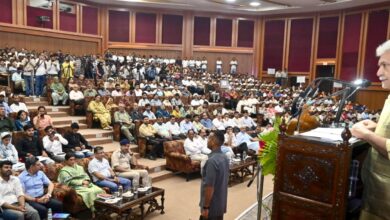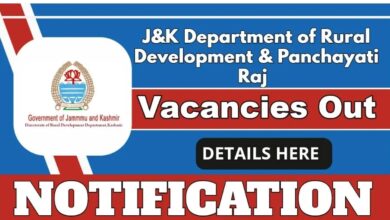CUET-UG Issues In J&K Being Addressed: UGC Chairman

Jammu, Feb 23 (WD): The University Grants Commission (UGC) does not want to be a regulator but a facilitator and transform the higher education sector, its chairman Jagadesh Kumar said here on Friday. The UGC Chief said that seven times more students appeared from Jammu and Kashmir last year in the Common University Entrance Test-Undergraduate (CUET-UG) to get admission in the best of universities across the country. He said the issues faced by candidates in the previous edition will be addressed this year.
Lieutenant Governor Manoj Sinha had last year raised the issue of lack of CUET examination centres in Jammu and Kashmir with the Union Education minister Dharmendra Pradhan, saying various candidates were allotted centres which were over 300 kms away. “UGC does not want to be a regulator but a facilitator and work with the stakeholders to bring transformation in higher education with the implementation of the National Education Policy (NEP) which was announced in 2020,” Kumar told reporters on the sidelines of the national conference on NEP at Indian Institute of Management here.
The conference was held to deliberate on the implementation of the National Education Policy in higher education institutes in Jammu and Kashmir and Ladakh.
On the past problems with the CUET, Kumar said, “There were some issues faced by the students and those have been addressed. Last year, it was a computer-based test but now we are introducing OMR and the CEUT will be conducted in hybrid mode so that colleges and schools are used as centres and our students get an opportunity to appear in the exam nearby.”
Earlier, admissions in universities were based on board marks and that put a lot of stress on the students, he said. “That stress level has gone down with the introduction of CUET and all the students are getting a level-playing field. CUET has brought complete transformation and strengthened national integration.”
The UGC chairman also batted for appointment of ombudsman in universities and colleges, as well as grievance redressal committees, to address the students’ problems. More than 400 academics and policymakers, including vice chancellors, deans, principals and heads of departments from higher educational institutions, attended the conference.
The participants, divided in groups of 10, engaged in sessions to deliberate on specific areas of focus for the implementation of NEP 2020.
Kumar said at least 78 universities will be covered under centrally sponsored Pradhan Mantri Uchchatar Shiksha Abhiyan (PM-USHA) for infrastructural upgradation. He said that UGC has announced several reforms with the launch of NEP. “The NEP will open up a lot of opportunities for our young people and help them in becoming entrepreneurs and excel in the profession of their choice because NEP focuses on providing multidisciplinary and holistic education, providing opportunities to students to acquire knowledge through experiential learning. It also talks about capacity building of our teachers,” the UGC chairman said.
Kumar said the Central Board of School Education is also introducing reforms by introducing vocational training, the first phase of which will cover class 9 to 12 followed by a second phase covering class 6 and above. “We are working with the election commission to increase the awareness among the students about their constitutional responsibilities by coming out to vote. “Similarly, the parliament introduced new (criminal) laws based on our own Indian ethos, we sent out circulars and information to bring awareness among the students about these laws,” he said.
Admitting it is tough to implement any policy in one-go, he said, “there is a lot of diversity in our education system as many institutions are located in rural and remote areas where they are facing problems of their own. Some institutions do take time but we have to sit and discuss the problems with them and try to solve those problems for better results.”
Asked about changes after the 2019 abrogation of Article 370 that granted special status to J&K, he said the focus is on books, laptops and polishing creative minds so that the country can be “fully developed by 2047.” “Looking from the perspective of education in J&K, now the opportunities are growing and the students are exploring higher education outside the union territory,” he added.





